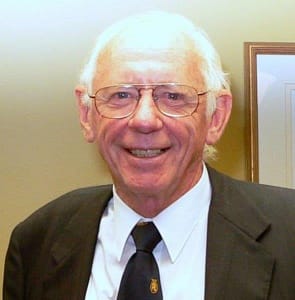 At a recent celebration for John Hyde, where he was presented with a festschrift, I was asked to describe him in three words. I chose heroic, wisdom and tenacity. This is the full article I wrote for the occasion.
At a recent celebration for John Hyde, where he was presented with a festschrift, I was asked to describe him in three words. I chose heroic, wisdom and tenacity. This is the full article I wrote for the occasion.
Heroic, wisdom, tenacity
When John Hyde speaks we should listen. I have learnt that lesson over my many years of friendship with John. On two occasions, when I was living in Kalgoorlie, John phoned with brief suggestions that I visit Perth to meet a significant person. He simply said, “Manners, you should be in Perth next week, as there is someone here who I would like you to meet.” He never mentioned who, but I responded positively on both occasions and it gave me the opportunity to have lunch with two very significant individuals.
On one occasion this was the noted British historian and author, Paul Johnson. On the other occasion it was Lord Peter Bauer with whom, a year later, I spent several weeks in Moscow and St. Petersburg. We were joint participants in Russia’s Transition to Freedom Seminar, organised in 1991 by the Cato Institute.
During John’s nine years in federal politics he was an intellectual giant amongst pygmies and one of the few who recognised Australia’s dangerous drift toward diminishing freedoms. I recall the late Justice George Sutherland once saying:
“For the saddest epitaph which can be carved in memory of a vanished freedom is that it was lost because its possessors failed to stretch forth a saving hand, while there was still time.”
What an appropriate theme to connect with John Hyde. Those who know John appreciate how he has devoted many years of his life to doing just that, “stretching forth a saving hand while there was still time.” If you want to discover the real character of a man, just ignore what he says about himself and look instead at his dealings with other people.
If only I could say the same for government
The same is true of governments — ignore what their extensive and expensive propaganda departments say about themselves, and judge them instead on how they deal with their own people. Do they steal from some and give it to others? Do they indulge in such acts that would be illegal for individuals?
John set a standard by which politicians should be measured. In the late ‘70s and early ‘80s, John, with a small band (approximately 10 in number) called the ‘Dries’, became alarmed at the way government policies almost always resulted in impoverishing further the Australian public. They set about to devise ways of reversing that trend.
They orchestrated a range of policies to revitalise Australia but were astonished at how their own party, the Liberal Party, treated these ideas. The ideas were treated the same way that the human body treats strange proteins; it rejected them. This agenda was ready-made and awaiting the Australian Labor Party (ALP) when they were swept to power in 1983. The ALP claimed these policies as a momentary alternative to their full-frontal socialism.
The details are well-documented in John’s book Dry: In Defence of Economic Freedom. American author Lew Rockwell wrote a similar book from the US point of view, Speaking of Liberty, and in describing his book, he also accurately described John’s book:
“What possible difference can another book make? Why should anyone care about the message of one book as compared with its many millions of competitors? It comes down to this.
Though there is an astounding proliferation of words in our time, there is a drastic shortage of something that is essential to the survival of civilization: defences of property against its ubiquitous enemies and its main enemy, the State. Core principles contain within them the power to slice through billions of other words based on trivia and fallacy. Though we are out-numbered and out-gunned on every front, we believe in the power of ideas to make a difference. This is why we libertarians write.”
Making a difference
John Hyde has made a difference, by bringing ideas to the threshold of people’s consciousness, with his book, with his 550 newspaper articles, but, more importantly, with his consistency in putting principle before politics.
I am personally aware of the very real outcomes of John’s reformist zeal. The outcomes arrived, in the midst of my business career. Coming out of decades of economic stagnation, suddenly, to use the sailing ship analogy, Australia’s sails were filled with wind. Australia accelerated at full speed. I was a beneficiary of these great years, so am personally grateful to John, and equally sad to see Australia, again, stuck in the doldrums!
In short, because of John Hyde, I enjoyed a ‘golden age’ in Australia’s economic prosperity. I would like to see future generations of Australians enjoy these same opportunities. That simple goal is one of my main motivators. Now, as John leaves our Mannkal board, after being there from the first day, 21 years ago, he leaves us with three important gifts:
- His friendship
- His residual wisdom
- His book Dry: In Defence of Economic Freedom as an inspiration of how good policy can revive a stagnant economy.
Our challenge at Mannkal is to take on the task of developing fresh, courageous young minds who will take up the challenge of reinvigorating our nation and guiding its path to as yet untapped potential. We wish John and Helen many more years of happiness together and assure them that their spirit of reforms will become contagious in future generations of young Western Australians.
